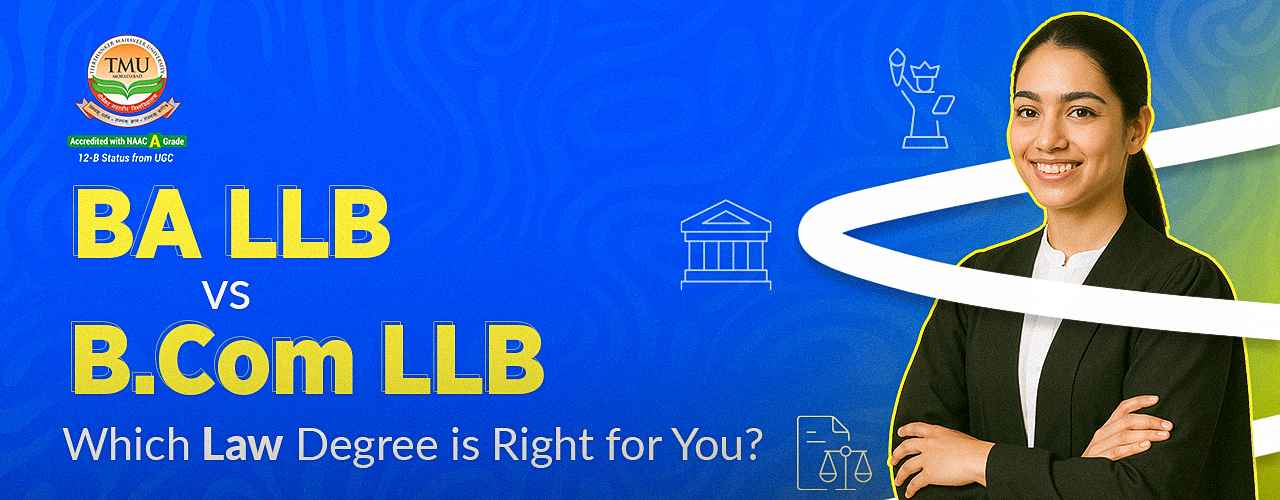BA LLB vs B.Com LLB: Which Law Degree Should You Choose?
Table of Contents
Pursuing BCom LLB admission is an excellent choice for students aiming to build a career at the intersection of business and law. This integrated programme combines the study of commerce and legal principles, equipping graduates with a unique blend of financial knowledge and legal expertise. By enrolling in BCom LLB admission, students gain the skills needed for corporate law, legal consulting, compliance management, and entrepreneurship, setting a strong foundation for a successful legal and business career.
Integrated law programmes, typically spanning five years after 10+2, are designed to give you a strong foundation in both a core discipline and legal principles. Let's delve into how your academic background can guide your choice.
BA LLB vs. B.Com LLB
Both Bachelor of Arts and Bachelor of Legislative Law (BA LLB) and Bachelor of Commerce and Bachelor of Legislative Law (B.Com LLB) are highly respected five-year integrated programmes. They lead to the same ultimate qualification to practice law, but the "bachelor's" component sets them apart, influencing the type of legal expertise you develop.
Comparative Table of BA LLB vs B.Com LLB
| Feature | BA LLB | B.Com LLB |
| Duration | 5 Years | 5 Years |
| Eligibility | 12th in any stream | 12th with Commerce preferred |
| Focus Areas | Arts, Society, Politics + Law | Commerce, Finance, Business + Law |
| Ideal For | Civil services, NGOs, Human Rights, Judiciary | Corporate Law, Finance, Taxation, Legal Advisory |
| Core Subjects | Political Science, Sociology, History | Accounting, Business Studies, Economics |
| Best Career Fields | Litigation, Public Policy, Academia | Corporate Sector, Banking, Tax Law |
| Suitable for CA/CS | Less suitable | Highly suitable |
| Humanities Emphasis | High | Low |
| Corporate Focus | Medium | High |
| Government Job Alignment | Strong | Moderate |
Teerthanker Mahaveer University
Apply for Admission
Click Here To Apply for Admission
What is BA LLB?
The Bachelor of Arts and Bachelor of Legislative Law (BA LLB) combine a study of humanities and social sciences with a comprehensive legal curriculum.
Key Components for Arts Students:
- Humanities & Social Sciences: Subjects like History, Political Science, Sociology, Economics, English Literature, and Psychology form the bedrock. This equips students with a deep understanding of societal structures, governance, human behaviour, and historical precedents – all crucial for nuanced legal interpretation.
- Legal Subjects: Core law principles, including Constitutional Law, Criminal Law, Contract Law, Torts, Family Law, Environmental Law, Public International Law, and Human Rights Law.
If you come from an Arts background (or even Science with an interest in the humanities) and possess:
- A strong interest in history, political science, sociology, and societal issues.
- Excellent communication, critical thinking, and analytical reasoning skills.
- A passion for public policy, social justice, human rights, or civil services.
Then, BA LLB is likely the ideal path for you. It leverages your existing strengths and enhances your ability to understand the broader social context in which laws operate.
What is B.Com LLB?
The Bachelor of Commerce and Bachelor of Legislative Law (B.Com LLB) integrates core commerce and business subjects with specialised legal studies.
Key Components for Commerce Students:
- Commerce & Business: This includes subjects like Financial Accounting, Business Studies, Economics, Taxation, Corporate Governance, Auditing, and Management Accounting. This foundation provides a keen insight into how businesses operate, manage finances, and interact with the economy.
- Legal Subjects: While covering general law principles, B.Com LLB places a greater emphasis on laws directly related to business and finance, such as Corporate Law, Banking Law, Taxation Law, Intellectual Property Law, and Competition Law.
If you come from a Commerce background and are inclined towards:
- Numbers, financial statements, and economic principles.
- The functioning of businesses, corporations, and markets.
- A career in the corporate sector, finance, or taxation.
Then B.Com LLB will provide you with a significant advantage. You'll develop a unique blend of business acumen and legal expertise, highly valued in today's corporate world.
Eligibility criteria for pursuing BA LLB & B.Com LLB
Candidates generally need to have passed their 10+2 (higher secondary) examination from a recognised board with a minimum aggregate score, typically between 45% and 50%. Some universities may have specific subject requirements, like a background in mathematics or commerce for B.Com LLB. Additionally, most institutions require candidates to appear for and qualify in a law entrance exam, such as CLAT or a university-specific exam.
Career Opportunities after BA LLB
The career prospects for BA LLB graduates are both diverse and impactful, particularly for those drawn toward public service, social justice, or the courtroom. This program lays the perfect foundation for entering fields that require a deep understanding of society, human rights, governance, and law.
Litigation and Legal Practice
BA LLB graduates commonly pursue careers as advocates, working in trial courts, high courts, and even the Supreme Court. The combination of arts and legal subjects equips them with analytical, argumentative, and research skills—vital for courtroom advocacy. Many students start by interning under senior lawyers and eventually establish their practice.
Civil Services and Judiciary
One of the major reasons students opt for BA LLB is its alignment with civil services like IAS, IPS, and state PSCs. Subjects like political science and sociology are core components of the UPSC syllabus, making this degree an excellent preparatory platform. Additionally, graduates can appear for judiciary exams (PCS-J) to become judges after gaining some courtroom experience.
Public Policy and NGOs
BA LLB students often find themselves inclined toward policy-making, think tanks, or non-governmental organisations (NGOs). Their background in constitutional law and social science makes them ideal for roles in legal advocacy, social justice, and law reform.
Academia and Research
For those passionate about teaching or research, this degree provides a path toward academia. Many go on to pursue LLM and eventually PhDs, contributing to legal scholarship and becoming professors at reputed universities.
Media and Legal Journalism
Some BA LLB graduates venture into legal journalism, using their understanding of law and current affairs to write for newspapers and online portals or work as legal correspondents for TV channels.
In summary, the BA LLB provides opportunities for meaningful careers that extend beyond the corporate realm, particularly for individuals seeking to influence the legal, political, or social landscape of their nation.
Career Opportunities after B.Com LLB
Graduates of B.Com LLB often head straight into the corporate world, where there’s a massive demand for legal professionals with a solid foundation in commerce and finance. If you envision yourself working with MNCs, law firms, or financial institutions, this degree could be the perfect fit for you for you.
Corporate Law and Compliance
B.Com LLB is tailor-made for corporate legal roles. Graduates can work as legal advisors, corporate counsels, or compliance officers in companies. They deal with mergers, acquisitions, contracts, company law issues, and internal policy formulation.
Taxation and Financial Law
If you're good with numbers and tax codes, you can specialise in tax law, helping clients with income tax, GST, or corporate tax disputes. Many graduates also work with accounting firms, helping ensure legal compliance during audits and financial reporting.
Banking and Insurance Law
The financial sector loves B.Com LLB graduates for their dual expertise in law and finance. Banks, NBFCs, and insurance companies hire them for handling contracts, legal recovery processes, and regulatory compliance.
Legal Roles in MNCs
Multinational companies often hire B.Com LLB graduates as in-house counsels. These roles come with high pay packages and deal with global trade laws, intellectual property, and cross-border contracts.
Chartered Accountancy and Company Secretary
One massive advantage of B.Com LLB is its overlap with CA and CS courses. Many students pursue these professional certifications alongside or after their law degree, opening doors to lucrative positions in audit firms, stock exchanges, and regulatory bodies.
Entrepreneurship and Startups
With legal and business knowledge combined, some B.Com LLB graduates start their legal consultancies or even businesses, helping startups navigate the complex regulatory maze.
B.Com LLB is ideal for those aiming at structured, high-paying careers in the corporate and financial sectors, rather than courtroom advocacy.
Does Your Integrated Degree Matter for the Judiciary?
A common question among aspiring legal professionals is: "Does my integrated degree (BA LLB or B.Com LLB) impact my chances of entering the Judiciary or Civil Services?"
The simple answer is: Not significantly.
Once you obtain your Bachelor of Legislative Law (LLB) qualification, the pathway to the judiciary or civil services becomes equally accessible to graduates of both BA LLB and B.Com LLB. The entrance examinations for these esteemed professions (like the Judicial Services Examination or UPSC Civil Services Exam) primarily test your legal knowledge, general awareness, current affairs, and aptitude—areas that are thoroughly covered in both integrated programs.
What truly matters for these careers is your dedication to mastering legal principles, your ability to analyse complex situations, and your commitment to rigorous preparation for these competitive exams, irrespective of whether your foundational degree was in Arts or Commerce. Both degrees equip you with the legal reasoning skills essential for these roles.
Colleges for pursuing BA LLB or B.Com LLB
- Most rankings for law colleges in India are based on faculty quality, research output, and placement success. Colleges like NLSIU, NALSAR, and NLU Delhi consistently rank among the top 5 for law programmes.
- Private universities like Jindal Global Law School, Amity University, Manipal Law College and Teerthanker Mahaveer University also rank high due to their state-of-the-art facilities and national and international collaborations.
Why TMU College of Law and Legal Studies is best for your career?
Choosing the right institution is as crucial as selecting the right degree. TMU College of Law and Legal Studies, a distinguished faculty of Teerthanker Mahaveer University (TMU) in Moradabad, Uttar Pradesh, stands as a beacon of legal education excellence.
Here's why TMU Law College is the preferred destination for your integrated law degree:
- Diverse Program Offerings: TMU proudly offers BA-LLB (Hons.), BBA-LLB (Hons.), and B.Com-LLB (Hons.), providing a comprehensive range of choices that cater to various student backgrounds and career ambitions. This ensures you can pick the programme that truly resonates with you.
- Eminent & Supportive Faculty: Learn from highly experienced legal scholars and practitioners dedicated to mentorship.
- Practical Training: TMU provides extensive practical exposure through:
- State-of-the-art Moot Court sessions
- Regular workshops and seminars
- National and international conferences
- Mock Parliament and Model United Nations (MUN) simulations
- Legal aid clinics and community outreach programmes.
- Holistic Professional Development: Beyond academics, TMU focuses on honing essential soft skills, instilling professional ethics, and nurturing leadership qualities, preparing you for success in any legal arena.
- Affordable fee structure: TMU College of Law and Legal Studies is committed to providing excellent academic programs with a highly competitive and transparent fee structure, making it an accessible option for aspiring legal professionals
- Modern Infrastructure: Benefit from well-equipped smart classrooms, a vast digital and physical law library, modern computer labs, and a vibrant, conducive learning environment within the larger TMU campus.
- Internship & Placement Support: It facilitate valuable internship opportunities with leading law firms, corporate houses, legal departments, NGOs, and individual practitioners during academic breaks, ensuring you gain critical real-world experience and build professional networks.
TMU College of Law and Legal Studies is committed to shaping future legal luminaries—individuals who are not only legally proficient but also ethically sound and socially responsible.
Conclusion
Choosing between BA LLB and B.Com LLB is a significant decision that should be guided by your inherent interests and career aspirations. If you are passionate about the social sciences and envision a career in litigation, civil services, or public policy, BA LLB is your ideal pathway. If your strengths lie in commerce and business, and you aspire to excel in corporate law, finance, or taxation, B.Com LLB will give you a distinct advantage.
Remember, while your integrated degree provides a specialised foundation, your dedication, hard work, and the quality of your legal education are the ultimate determinants of your success in any legal field, including the prestigious Judiciary. With comprehensive programmes, practical training, and dedicated faculty, TMU College of Legal Studies is ideal for you in achieving your legal dreams.
Frequently Asked Questions (FAQs)
Q1. Which is better, BCom LLB or BA LLB?
Ans. Both BA LLB and BCom LLB are valid paths to a legal career, but they cater to different interests and career aspirations. BA LLB offers a broader foundation in humanities and social sciences, while BCom LLB focuses on law and commerce. The "better" choice depends on your individual interests and career goals.
Q2. Is CLAT compulsory for LLB?
Ans. No, CLAT (Common Law Admission Test) is not compulsory for all LLB programs. While it is required for admission to the five-year integrated LLB programs offered by the National Law Universities (NLUs) and some other participating institutions, many universities and colleges offer LLB programs (both 3-year and 5-year) through their own entrance exams or direct admission based on merit.
Q3. Which is better, a 5-year or a 3-year LLB?
Ans. The choice between a 3-year LLB and a 5-year integrated LLB depends on individual circumstances and career goals. The 5-year program is generally better for those sure about pursuing law directly after high school, while the 3-year program is suitable for graduates from other fields who wish to switch to law.
Q4: Is a B.Com LLB only for students who studied Commerce in 10+2?
Ans. While primarily designed for Commerce students, some universities may allow Science or even Arts students with strong mathematical/economic aptitude to apply, often requiring them to complete foundation courses. However, it's generally most beneficial for Commerce background students.















